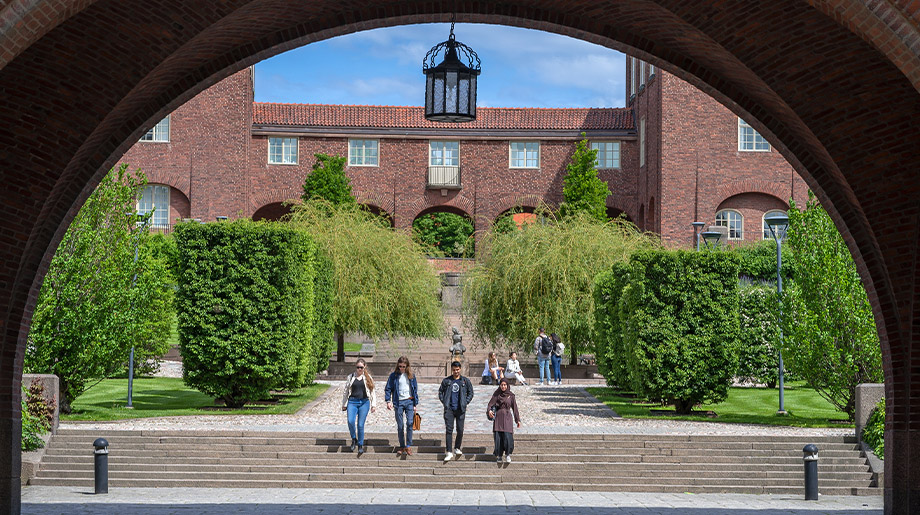MSc Innovative Technology for Healthy Living
The master's programme in Innovative Technology for Healthy Living focuses on technical solutions for wellness and active lifestyles. Big data obtained by sensors and wearables from regular citizens and professional athletes is translated into contributions to healthy living, boosting public health initiatives and wellness innovations. Graduates are R&D specialists with vital entrepreneurial skills, able to bridge human science, technology and health.

Innovative Technology for Healthy Living at KTH
The master's programme in Innovative Technology for Healthy Living is a collaboration between academia, research centres and industry. The programme fosters a new generation of master's graduates with advanced skills and approaches to health-related engineering and innovation. The programme equips you with the skills to develop technical and business solutions for healthy living and active ageing. Your future work will encourage good health habits in the general population and promote the future wellness of all citizens. A major goal of the programme is to enable future scientists and entrepreneurs to create engineering and business solutions allowing the citizens to monitor and manage their health by being informed and skilled in making wellness-driven choices.
The academic faculty involved in the programme has the knowledge and experience to develop, plan and implement sports and exercise activities for individuals (athletes, non-athletes and those with more sedentary lifestyles) and monitor the effects or the impact of such involvement and participation on their health and well-being, using evidence-based on anthropometric, biomechanical, biochemical, physiological and psychological parameters. Today's rapid developments in sensor technology, mobile data acquisition, and improved risk assessment methodologies combined with Big Data analysis allow the development of pervasive and personalised solutions. The potential of these personalised solutions can span all levels, from cellular through organismic to systemic.
The curriculum includes traditional theoretical and practical training and courses that implement active learning and teaching strategies, team collaboration, aligned teaching, ideation, project management and entrepreneurship skills gained outside the university setting. Challenges within the multidisciplinary areas associated with healthy living and active ageing, and that relate directly to innovation and entrepreneurship, include personalised lifestyle plans. The programme combines advanced scientific education, entrepreneurship training, learning-by-doing pedagogical approach and innovation workshops and round tables.
On successful completion of the programme, the graduates should be able to:
- Conduct independent research demonstrating a high level of discipline-specific skills;
- Illustrate a deeper understanding of practical translational research through laboratory practise or industrial rotations;
- Acquire skills relating to value-based healthcare to quantify the effect of the different interventions;
- Describe in detail the translation of innovative research to the clinical and commercial arena;
- Demonstrate awareness of the development and protection of Intellectual Property
International mobility during the programme
Each student is encouraged to spend their third semester at another university to gain other I&E experience and take courses not available at KTH. For example you might intern at other university's premises or through clinical, SME or industrial placements.
This is a two-year programme (120 ECTS credits) held in English. Graduates are awarded the degree of Master of Science. The programme is held at the KTH School of Engineering Sciences in Chemistry, Biotechnology and Health, with activities mainly held at the KTH campus in Flemingsberg, Stockholm.
Courses in the programme
The courses in the programme cover topics such as Health management, innovation and entrepreneurship, wellness, biomedical imaging and visualisation, biomechanics, sensor technology, big data analysis, personalised medicine, artificial intelligence and healthcare logistics.
Courses in the programme Innovative Technology for Healthy Living
Future and career
The master's programme in Innovative Technology for Healthy Living is a collaboration between partners from academia, research centres and industry to create a new generation of students with multidisciplinary research skills capable of translating research outcomes into innovation and entrepreneurship initiatives and business opportunities. Graduates lead the creation of new devices, services and professions for a healthier Europe. After graduation you can expect to take on roles such as innovator and entrepreneur within the medical technology, healthcare and wellness sector, project manager, healthcare and medical technology consultant, data analyst with a focus on healthcare and wellness advisor.
Keeping in mind that the topic of the final master's degree project is industry and clinically motivated, a natural step further is to explore the commercialisation and business potential of this topic. Graduates from the programme are qualified to join innovation projects at KI/KTH (for example, We@Work and POSITIVE), and leading industrial companies (for example, Philips, Maquet Critical Care and ContextVision), and have the potential to contribute to, for example, regulatory institutions and governing bodies.
Graduates may also be eligible to continue studies at the doctoral level at KTH or another university worldwide. KTH has a joint PhD programme with Karolinska Institutet (KI), one of the world's foremost medical universities also located in Stockholm.
Faculty and research
The research at the KTH School of Engineering Sciences in Chemistry, Biotechnology and Health covers many current and future emerging biomedical engineering topics such as image processing and visualisation, medical engineering, biomechanics, mechatronics, rehabilitation technology, precision medicine, Lab-on-Chip and Organ-on-Chip, artificial intelligence and healthcare logistics.
Research related to the programme is performed at the department Department of Biomedical Engineering and Health Systems , particularly in the divisions of Biomedical Imaging and Neuronic Engineering and, to an extent, the division of Health Informatics and Logistics.



